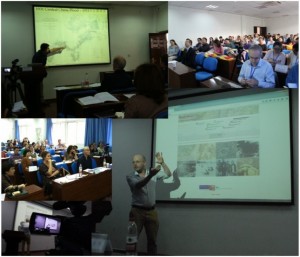Disasterhistory.org
Pierre Fuller
Web searches remain the predominant avenue for non-academic researchers seeking historical data or contextualisation. Yet online searches on the major topics that I have been researching and publishing on for years – famine, earthquakes and other types of disaster in East Asia – continue to produce next to nothing of much value or depth when performed by the general user (outside, that is, the subscription-walls of Jstor and other academic platforms). So a couple of years ago I held a workshop at Manchester where about a dozen historians from several continents were able to attend. What came out of it was the goal of making up-to-date and reliable information on the subject of disasters in Chinese history, currently beyond the reach of many outside academia, freely available online. We designed and built the site over the year, and a couple of us flew to a conference of anthropologists of disaster in Chengdu last month to formally launch DisasterHistory.org.
Some users have described the site to me as a welcomed public service, but all involved also stand to benefit: making the research conducted here at Manchester and by colleagues around the world more easily accessible simply makes our work more relevant. That can only be a good thing. As for how soon the site will be high in Google hits? That’ll come with time.
More than any other academic project I’ve worked on, DisasterHistory.org is all about colleagues volunteering their time and work. It grew out of a research network funded by the British Inter-University China Centre, and for the moment, the team of historians contributing are limited to those who have worked on disasters in Chinese history, but we hope to soon expand our content to cover other parts of the globe, to include other disciplines, and to use other languages, Chinese especially – although each of these (considering the complexity they add to site construction and functionality) might have to wait until a second stage of funding. For now I’m hugely grateful for colleagues, currently spread out in the UK, the US, Finland and China, for their ideas and contributions.
But there is another added dimension that I’m particularly excited out. With additional financial support from the University’s Learning Enrichment Fund, last spring I incorporated an optional disaster research project into the course work for my first year module Modern China, with the idea that, subject to review by an expert in the field, student work could help populate the site with articles on more obscure disasters; the work of six UG (plus 2 PG) students now appears on the site, which is a great chance for students to showcase their work online, and for the site to broaden its coverage.
As it grows in time as an informational platform and collaborative space, DisasterHistory.org should facilitate scholarly engagement with journalists and other professionals, possibly policymakers and practitioners, and the general public, while helping to shape future research questions and fostering projects that will meet practical and pressing needs beyond the academic world. We hope to build collaborative, data-pooling and data-mapping features into the site in order to foster opportunities for co-production of research by scholars worldwide, for example, on death counts and mortality rates, which in the case of famine are notoriously unreliable.
Better not to end on that depressing note, though. I encourage anyone with work that might be related to disasters (broadly-defined) in any discipline, or who might know a colleague-friend who does, or anyone with ideas on any type of collaboration, to be in touch as we move into our next stage!

